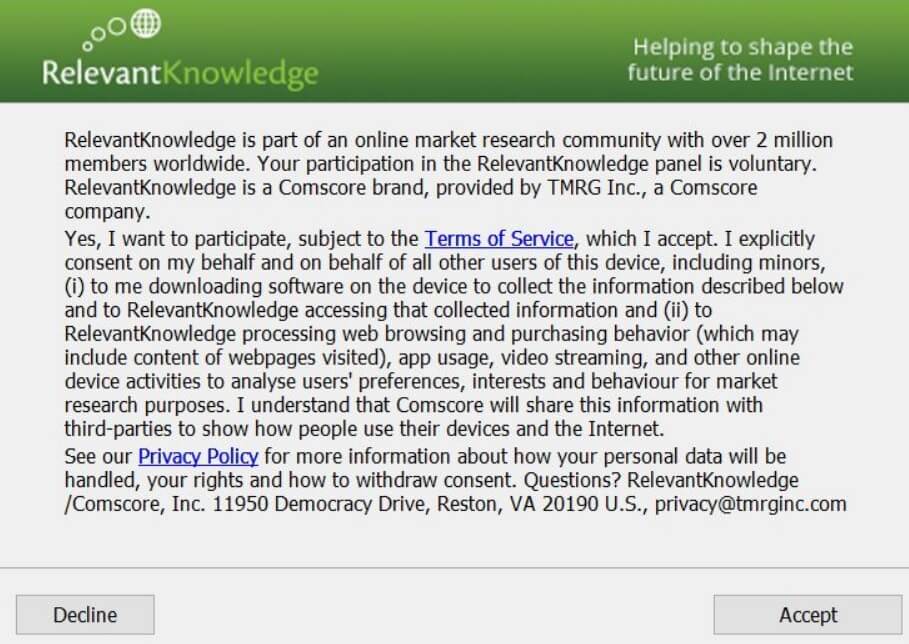What Is Relevant Knowledge Adware?
Relevant Knowledge pop-up ads affect your browser. Relevant Knowledge is a domain that will show pop-up ads and may redirect you if you click ads.
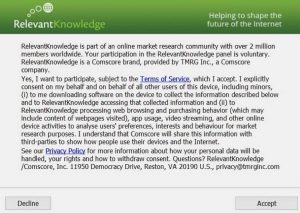
Relevant Knowledge is a malicious adware that is installed on your computer in some shape or form. It is there for the purposes of spying on you, using computer resources and sending and sharing information about your Internet usage. It could generate ads and redirects to websites containing spam, pop-ups and even some sort of malware. You could end up getting redirected to scam pages stating that you have viruses or an outdated program and you need to click somewhere or buy some software.
A single click could end up redirecting you, while your browser goes through dozens of pages, where a pay-per-click scheme could be active. On top of all that a software setup may launch which has hidden files, like registry entries and a Trojan which could lead to other malware downloading on your computer and using your machine’s resources.
Overall, nothing good can come out of that URL address connected with the redirect. The Relevant Knowledge redirect can obtain personal information about you, and also modify various settings on your browser.

Threat Summary
| Name | Relevant Knowledge |
| Type | Redirect, Adware, Malicious Domain |
| Short Description | Each browser application on your computer could get affected. The redirect can land you on dozens of unknown web pages and you might see a lot of advertisements. |
| Symptoms | You will see a lot of redirects, scams, advertisements and even malicious content such as scareware trying to force you to buy a product you don’t actually need. |
| Distribution Method | Freeware Installations, Bundled Packages |
| Detection Tool |
See If Your System Has Been Affected by malware
Download
Malware Removal Tool
|
| User Experience | Join Our Forum to Discuss Relevant Knowledge. |
Relevant Knowledge Ads – What Do They Do and How to Avoid Them
Relevant Knowledge could be distributed with various methods, the most effective of which is via third-party installation setups. Such installers usually come from bundled applications and freeware that is packed with additional features, set to be installed with some other software. The unpacking of anything additive could occur without any prior notification. You could have installed a video converter or some other free program and got your browser settings altered from this redirect.
Relevant Knowledge is a malicious adware that is installed on your computer in some shape or form. It is related to the Rlvknlg.exe Trojan Horse. The Trojan can trigger multiple redirects that could end you up on a URL address spreading malware. You should be careful if you see that redirect and try not to click anywhere on the newly-opened pages as you might trigger a hidden download for malware that installs into your personal computer.
If that happens, you could witness a lot more redirects and even advertisements of all kinds. The main redirect page of the domain can be seen from the snapshot right down here, although it can differ from user to user:
As seen in the above picture, it doesn’t seem like a malicious website, but simply redirects you to different pages and shows advertisements and pop-ups. Visiting the pages, might provide data about you and your browsing to people paying to adware campaigns to spam redirects for certain products in the form of advertisements. There are heaps of redirects stemming from the domain, making it unstable and not safe.
Even if your browser is passing through a domain which loads just for a few seconds, that domain could still plant a cookie, malware or acquire information about your computer machine or even your online habits. Moreover, there are similar threats that affect the browsers and computers of unsuspecting users, such as the aforementioned Rlvknlg.exe Trojan.
To conclude, know that you can get advertisements, redirects or other malware threats constantly implemented inside your computer and browsers or even more serious viruses from Relevant Knowledge Adware. Do not click anything as a cluster of redirects may be triggered.

Remove Relevant Knowledge Ads
To remove Relevant Knowledge manually from your computer, follow the step-by-step removal instructions provided below. In case the manual removal does not get rid of the ads and their files completely, you should search for and remove any leftovers with an advanced anti-malware tool. Such a program can keep your computer safe in the future.
- Windows
- Mac OS X
- Google Chrome
- Mozilla Firefox
- Microsoft Edge
- Safari
- Internet Explorer
- Stop Push Pop-ups
How to Remove Relevant Knowledge from Windows.
Step 1: Scan for Relevant Knowledge with SpyHunter Anti-Malware Tool
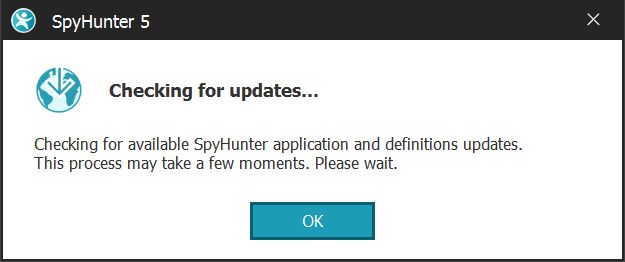
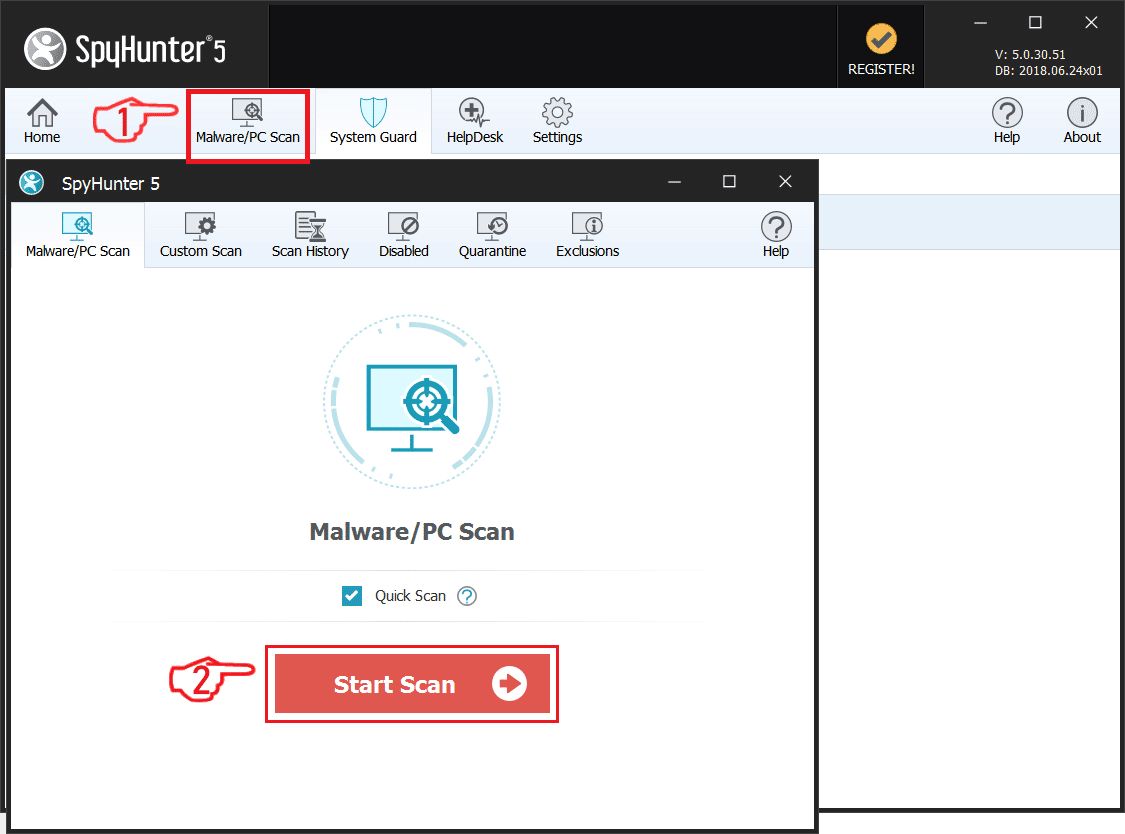
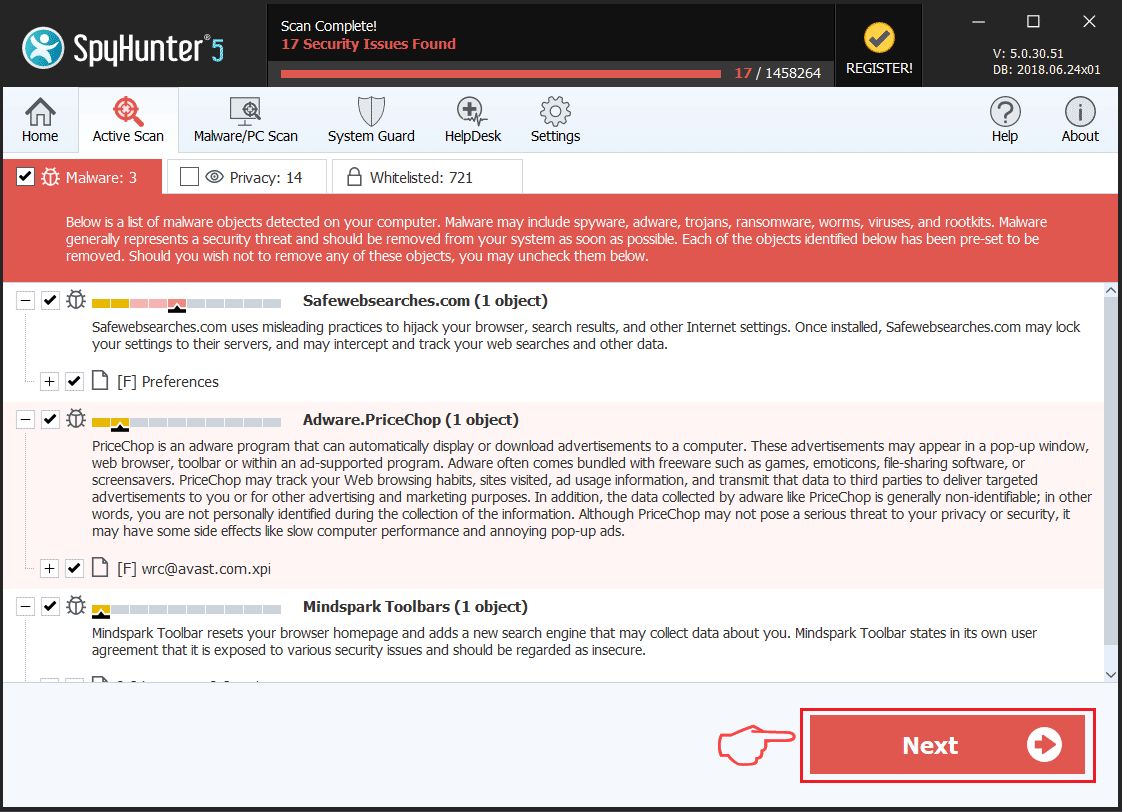
Step 2: Boot Your PC In Safe Mode

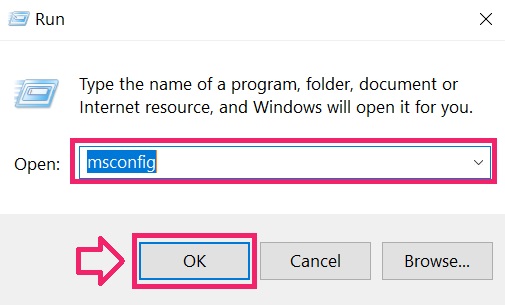
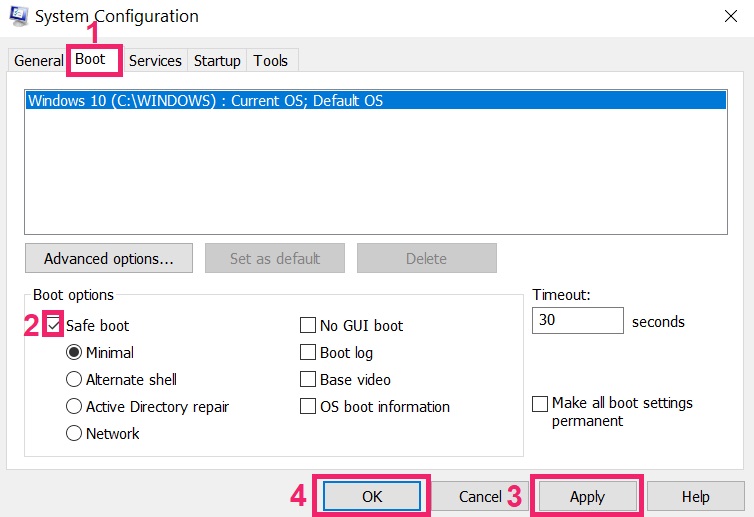
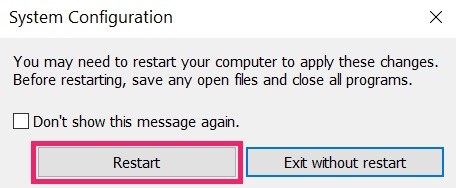
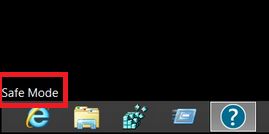
Step 3: Uninstall Relevant Knowledge and related software from Windows
Uninstall Steps for Windows 11
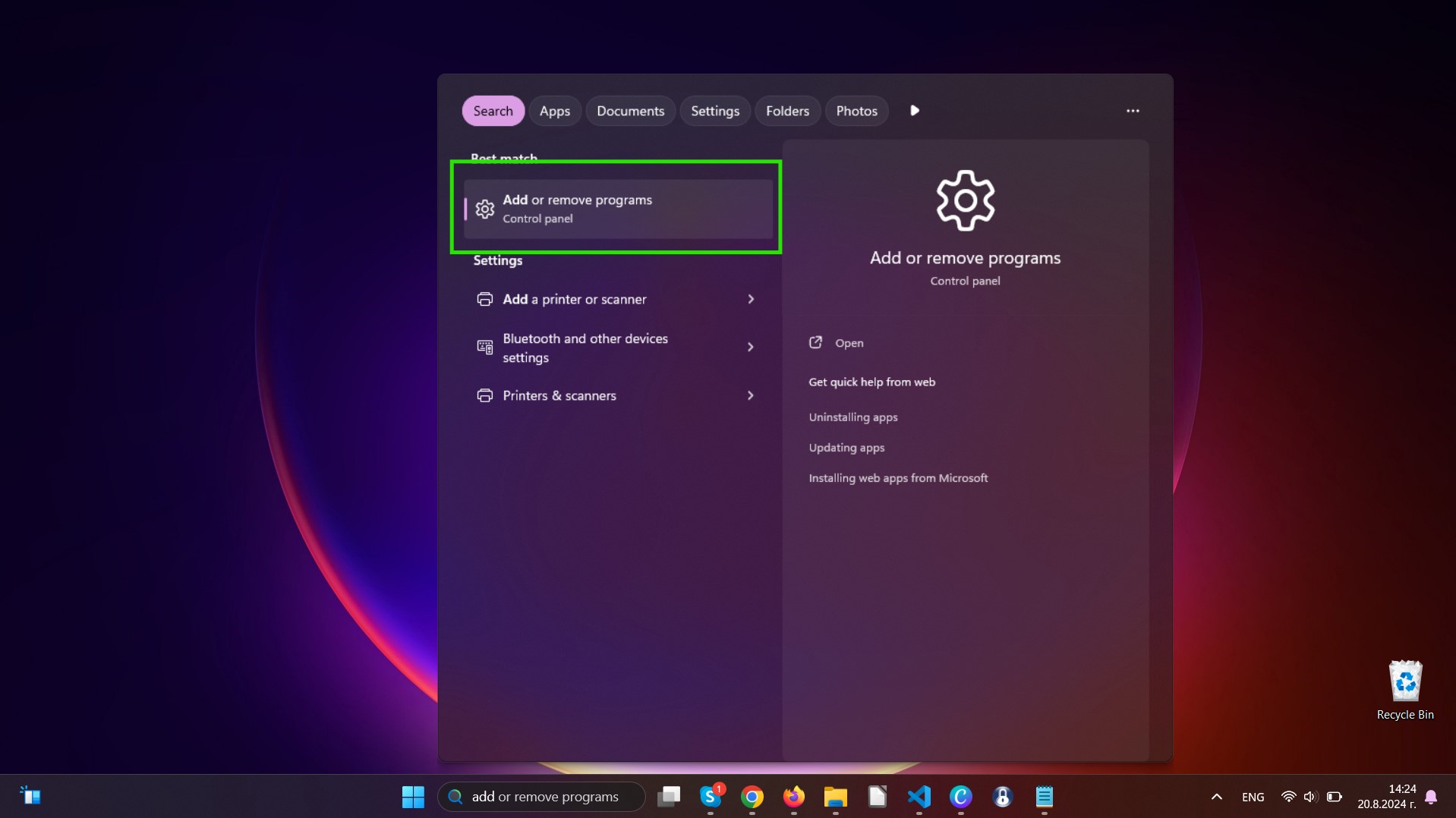
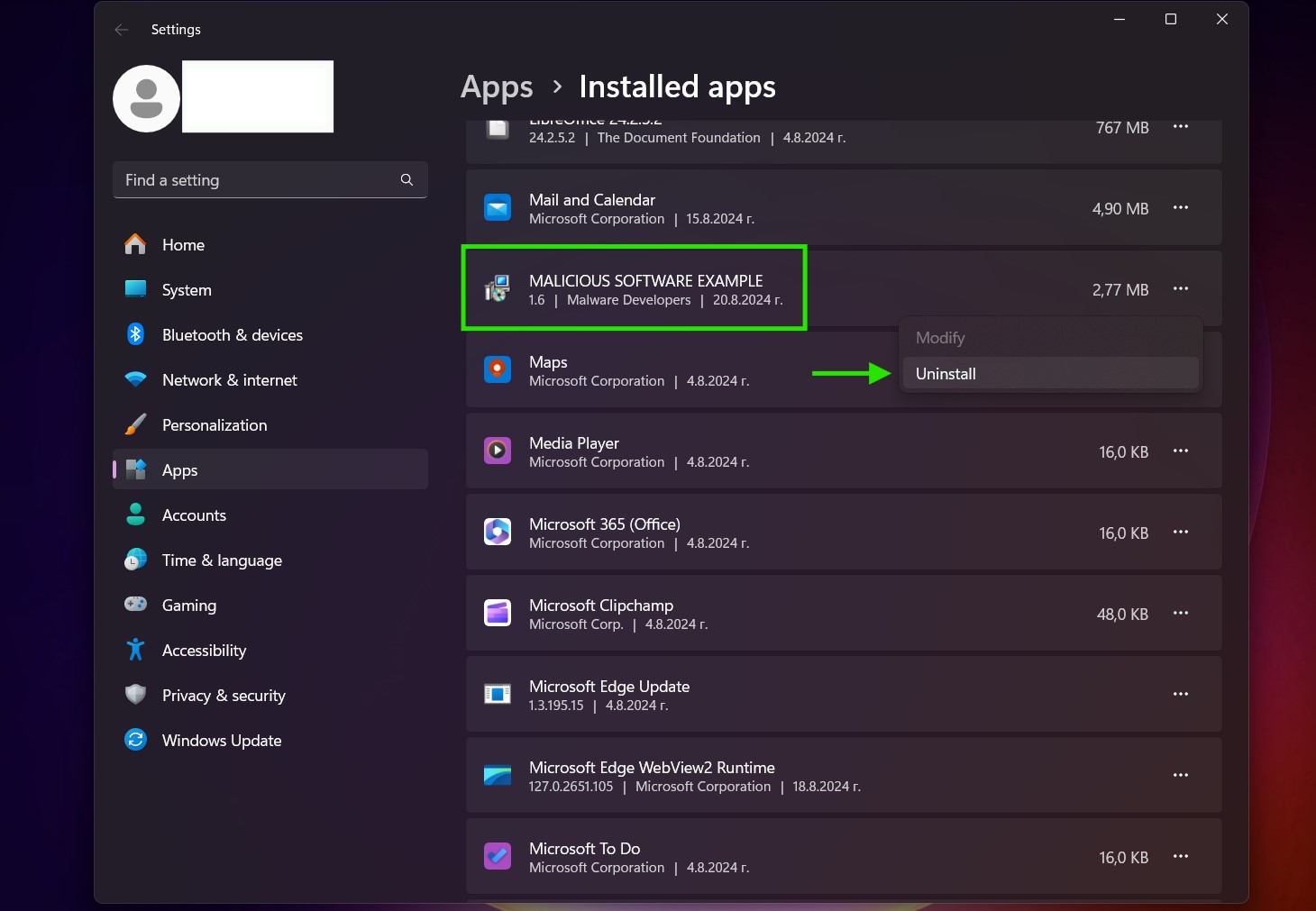
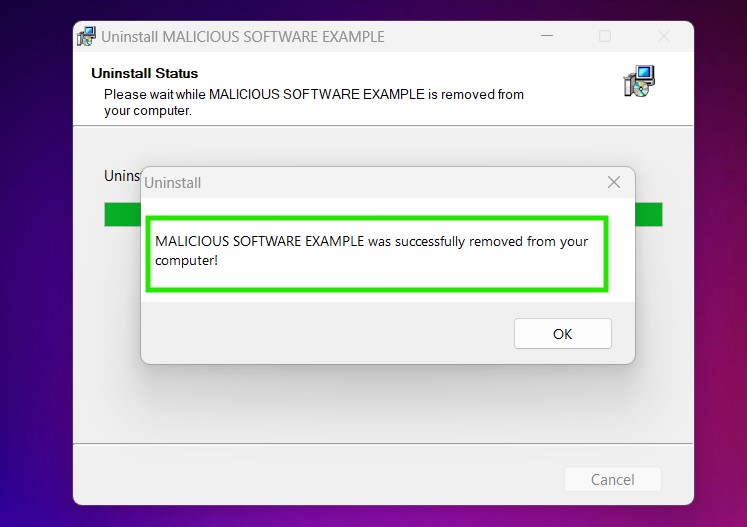
Uninstall Steps for Windows 10 and Older Versions
Here is a method in few easy steps that should be able to uninstall most programs. No matter if you are using Windows 10, 8, 7, Vista or XP, those steps will get the job done. Dragging the program or its folder to the recycle bin can be a very bad decision. If you do that, bits and pieces of the program are left behind, and that can lead to unstable work of your PC, errors with the file type associations and other unpleasant activities. The proper way to get a program off your computer is to Uninstall it. To do that:

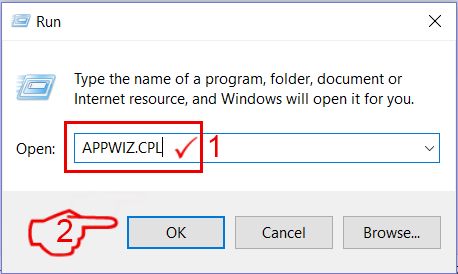
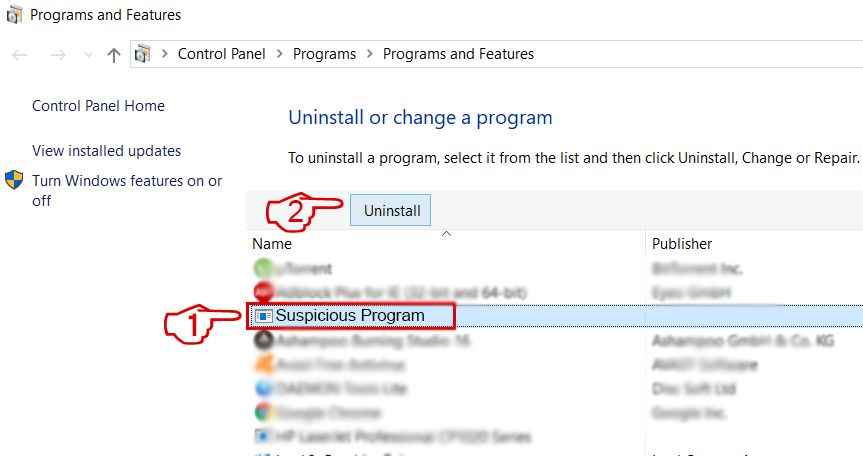 Follow the instructions above and you will successfully uninstall most programs.
Follow the instructions above and you will successfully uninstall most programs.
Step 4: Clean Any registries, Created by Relevant Knowledge on Your PC.
The usually targeted registries of Windows machines are the following:
- HKEY_LOCAL_MACHINE\Software\Microsoft\Windows\CurrentVersion\Run
- HKEY_CURRENT_USER\Software\Microsoft\Windows\CurrentVersion\Run
- HKEY_LOCAL_MACHINE\Software\Microsoft\Windows\CurrentVersion\RunOnce
- HKEY_CURRENT_USER\Software\Microsoft\Windows\CurrentVersion\RunOnce
You can access them by opening the Windows registry editor and deleting any values, created by Relevant Knowledge there. This can happen by following the steps underneath:
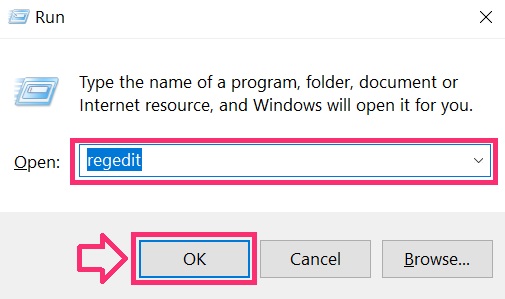

 Tip: To find a virus-created value, you can right-click on it and click "Modify" to see which file it is set to run. If this is the virus file location, remove the value.
Tip: To find a virus-created value, you can right-click on it and click "Modify" to see which file it is set to run. If this is the virus file location, remove the value.
Video Removal Guide for Relevant Knowledge (Windows).
Get rid of Relevant Knowledge from Mac OS X.
Step 1: Uninstall Relevant Knowledge and remove related files and objects
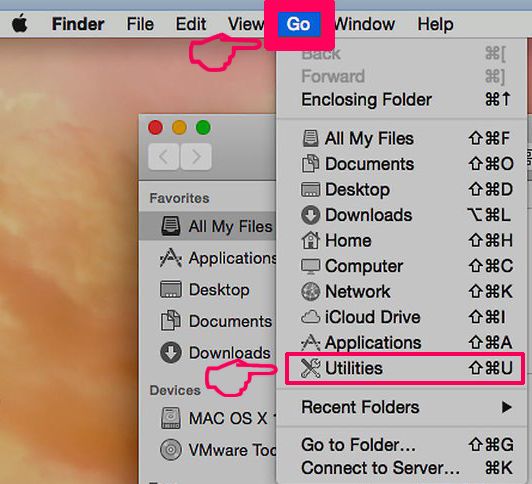
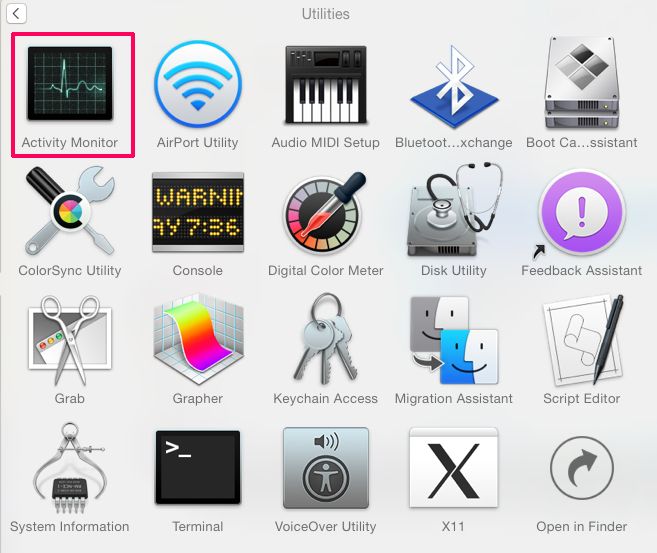
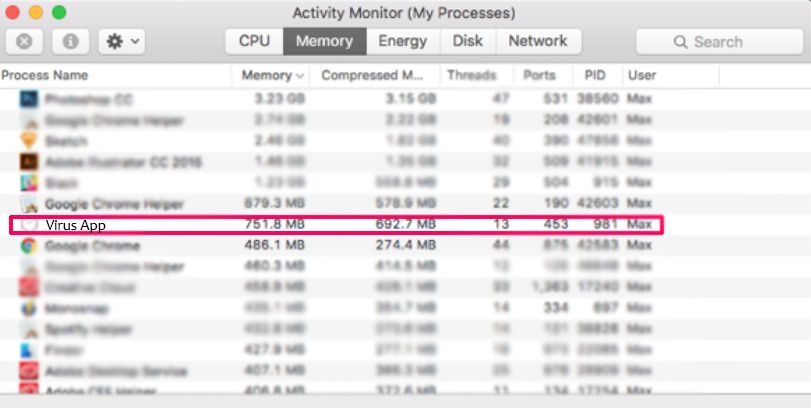
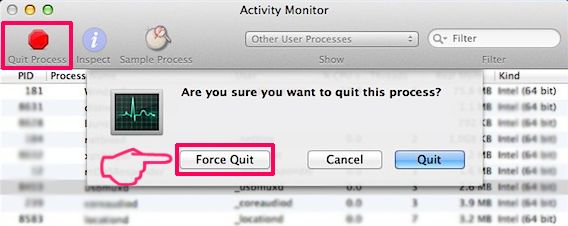
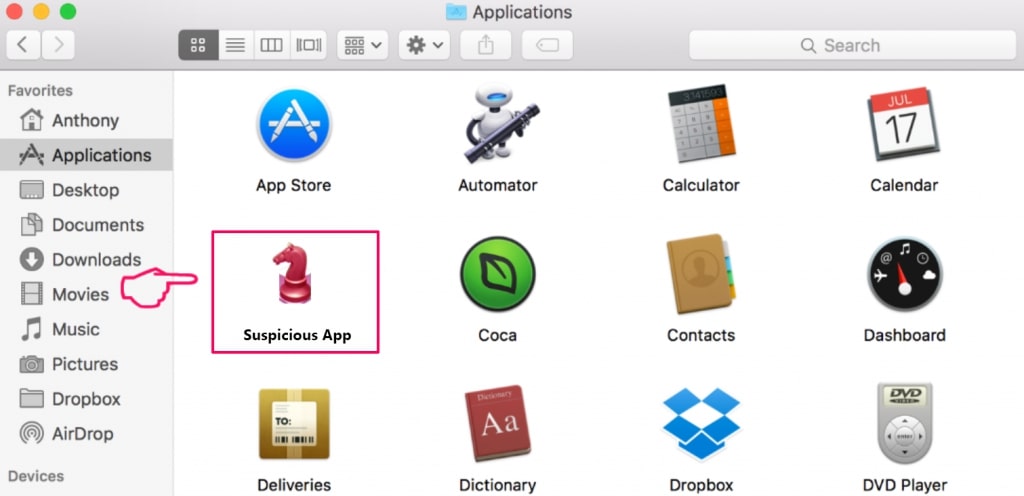
Your Mac will then show you a list of items that start automatically when you log in. Look for any suspicious apps identical or similar to Relevant Knowledge. Check the app you want to stop from running automatically and then select on the Minus (“-“) icon to hide it.
- Go to Finder.
- In the search bar type the name of the app that you want to remove.
- Above the search bar change the two drop down menus to “System Files” and “Are Included” so that you can see all of the files associated with the application you want to remove. Bear in mind that some of the files may not be related to the app so be very careful which files you delete.
- If all of the files are related, hold the ⌘+A buttons to select them and then drive them to “Trash”.
In case you cannot remove Relevant Knowledge via Step 1 above:
In case you cannot find the virus files and objects in your Applications or other places we have shown above, you can manually look for them in the Libraries of your Mac. But before doing this, please read the disclaimer below:
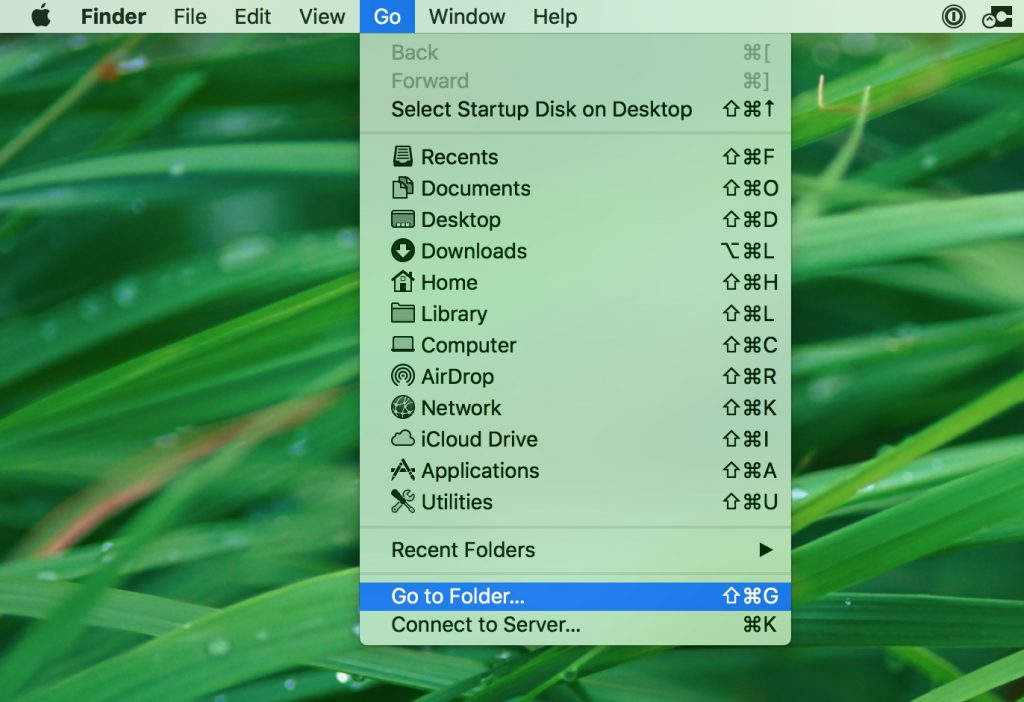
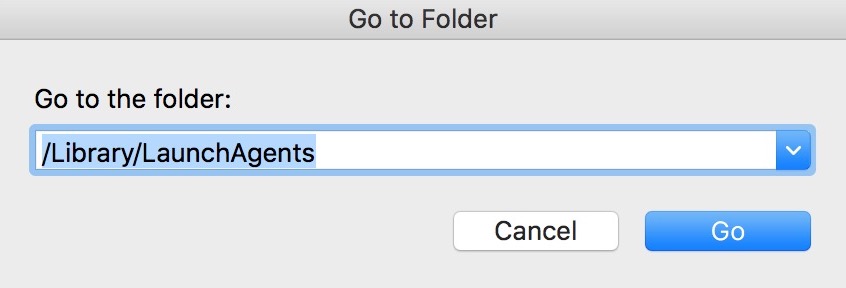
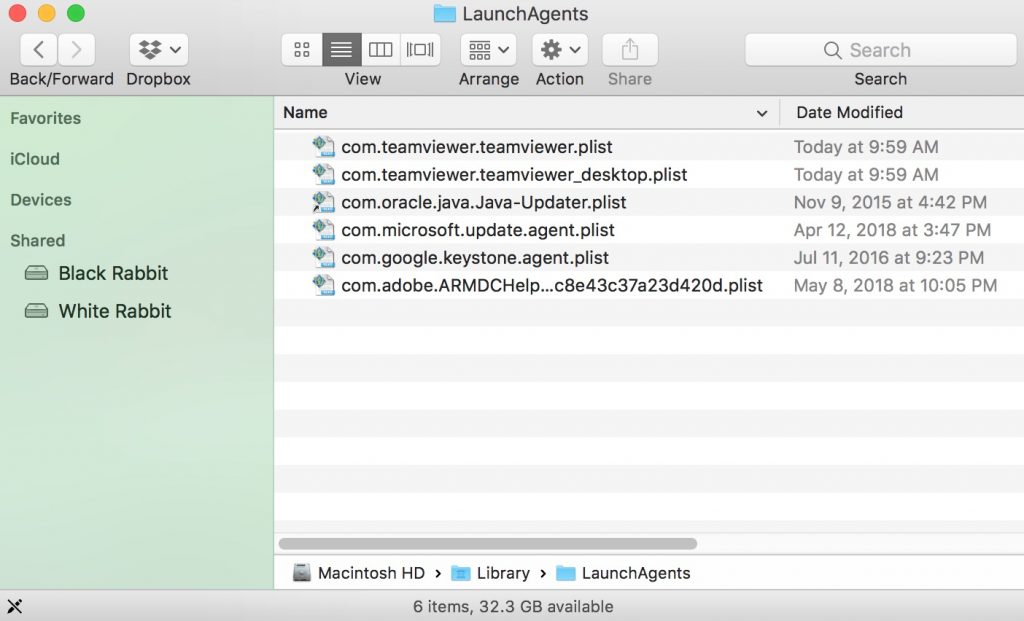
You can repeat the same procedure with the following other Library directories:
→ ~/Library/LaunchAgents
/Library/LaunchDaemons
Tip: ~ is there on purpose, because it leads to more LaunchAgents.
Step 2: Scan for and remove Relevant Knowledge files from your Mac
When you are facing problems on your Mac as a result of unwanted scripts and programs such as Relevant Knowledge, the recommended way of eliminating the threat is by using an anti-malware program. SpyHunter for Mac offers advanced security features along with other modules that will improve your Mac’s security and protect it in the future.
Video Removal Guide for Relevant Knowledge (Mac)
Remove Relevant Knowledge from Google Chrome.
Step 1: Start Google Chrome and open the drop menu
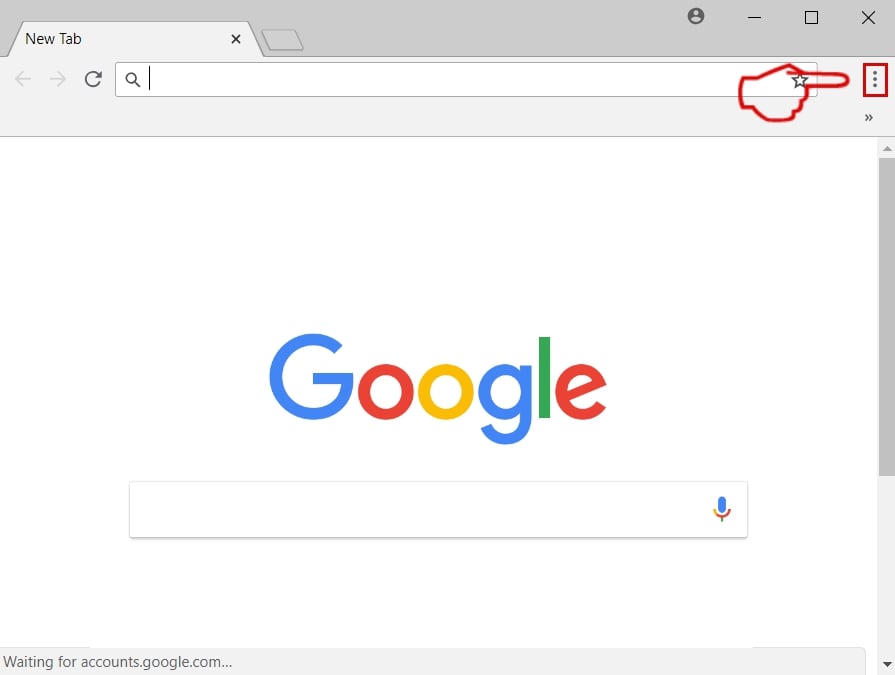
Step 2: Move the cursor over "Tools" and then from the extended menu choose "Extensions"
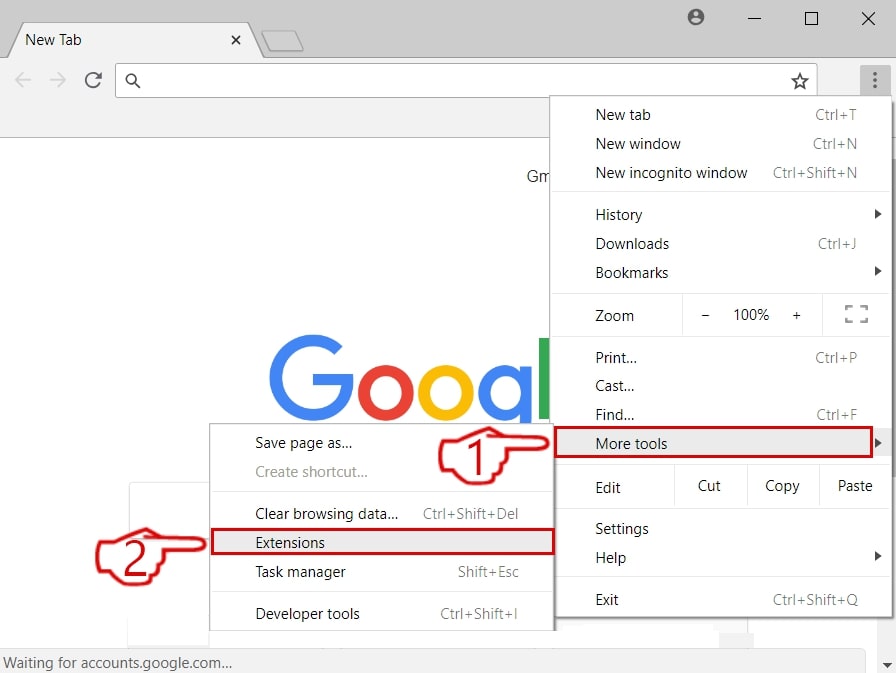
Step 3: From the opened "Extensions" menu locate the unwanted extension and click on its "Remove" button.
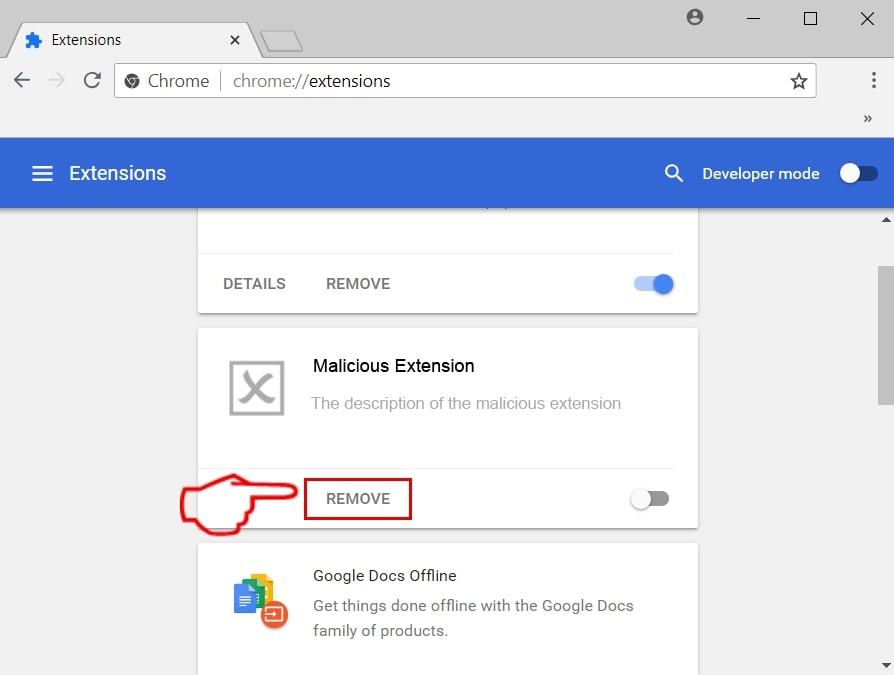
Step 4: After the extension is removed, restart Google Chrome by closing it from the red "X" button at the top right corner and start it again.
Erase Relevant Knowledge from Mozilla Firefox.
Step 1: Start Mozilla Firefox. Open the menu window:
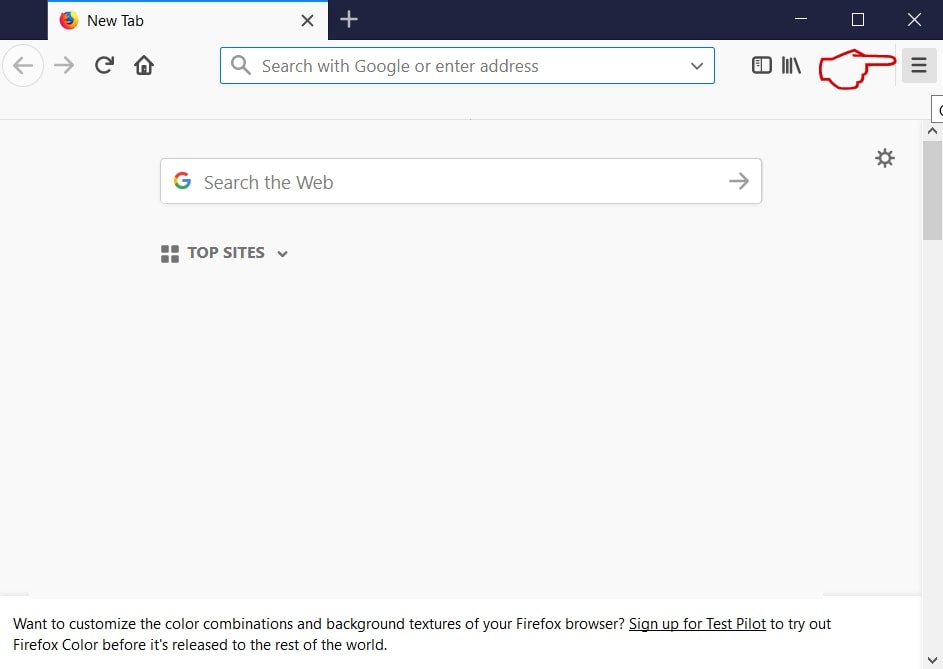
Step 2: Select the "Add-ons" icon from the menu.
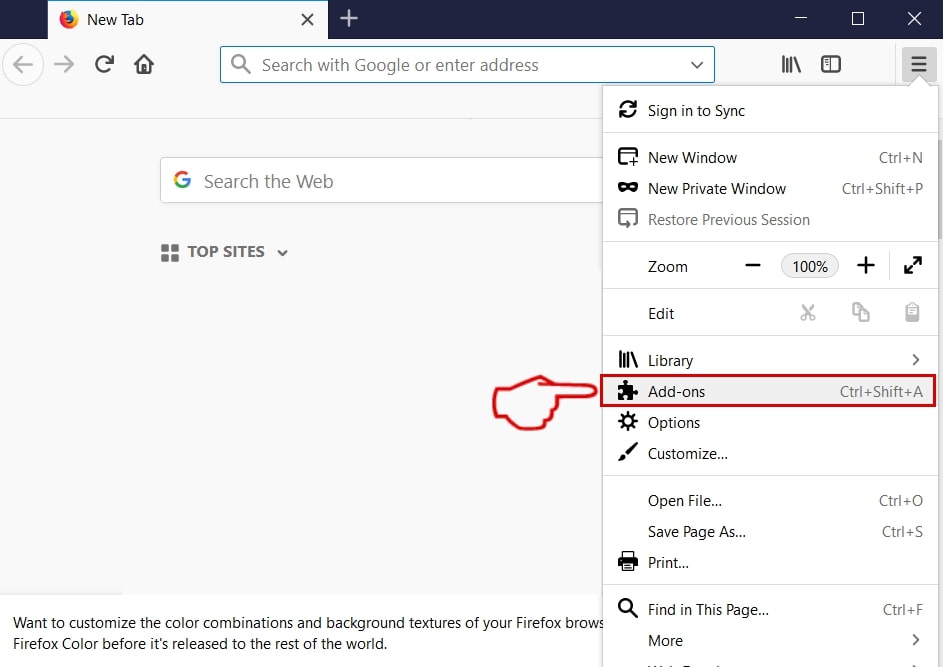
Step 3: Select the unwanted extension and click "Remove"

Step 4: After the extension is removed, restart Mozilla Firefox by closing it from the red "X" button at the top right corner and start it again.
Uninstall Relevant Knowledge from Microsoft Edge.
Step 1: Start Edge browser.
Step 2: Open the drop menu by clicking on the icon at the top right corner.
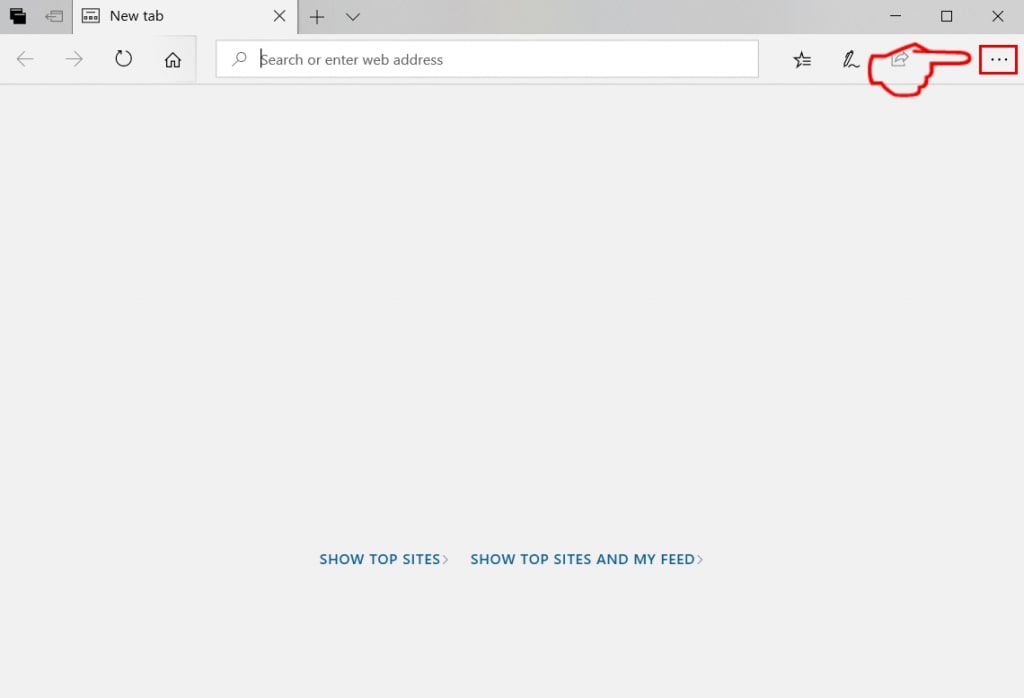
Step 3: From the drop menu select "Extensions".
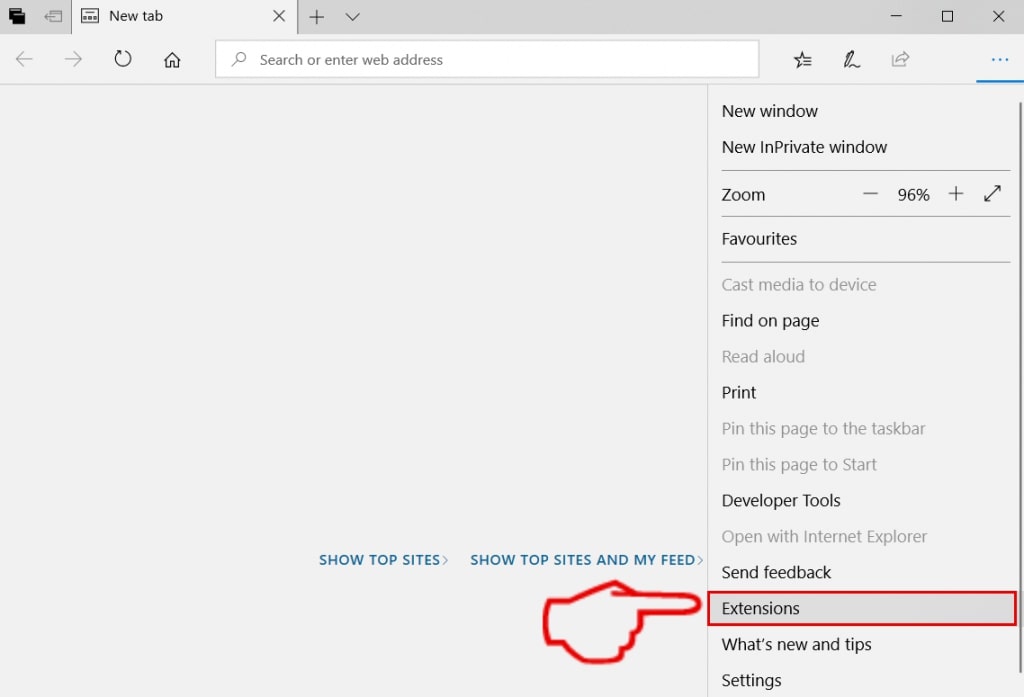
Step 4: Choose the suspected malicious extension you want to remove and then click on the gear icon.
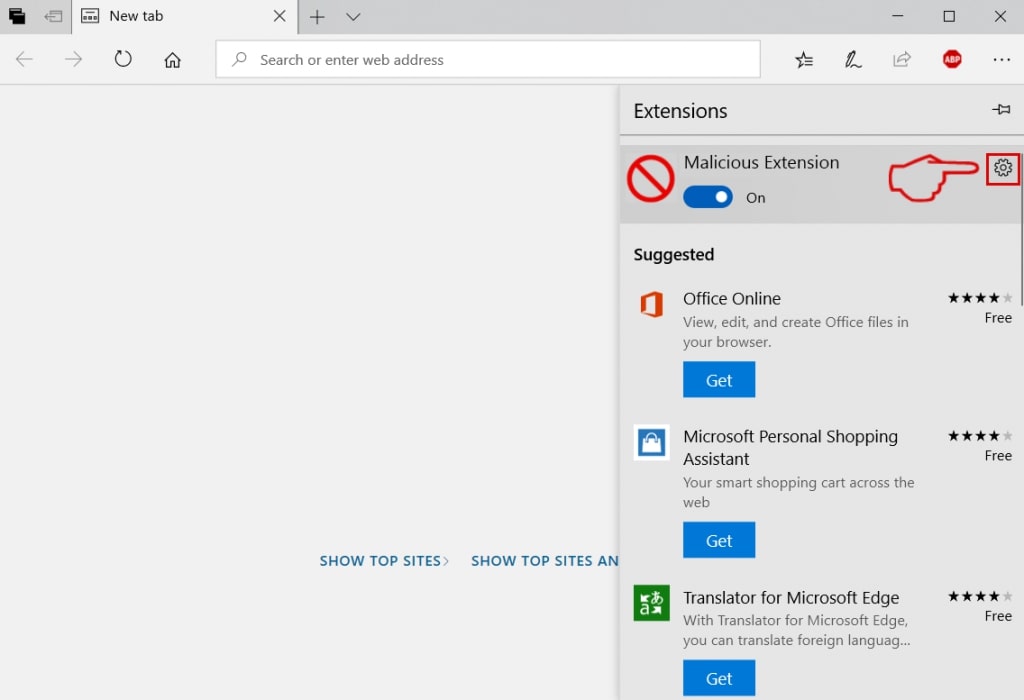
Step 5: Remove the malicious extension by scrolling down and then clicking on Uninstall.
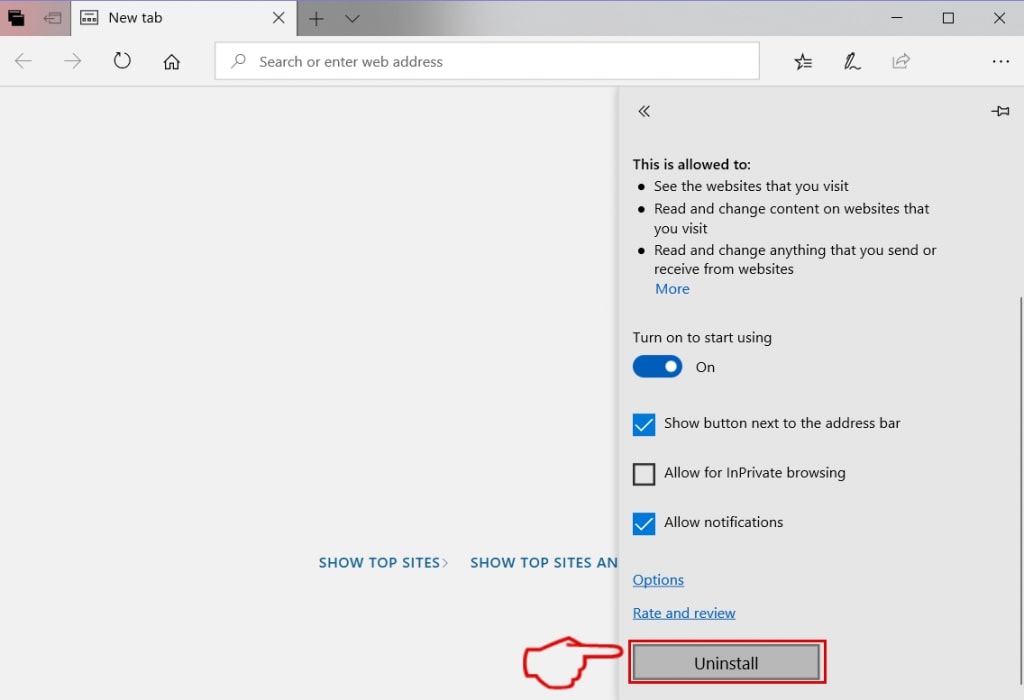
Remove Relevant Knowledge from Safari
Step 1: Start the Safari app.
Step 2: After hovering your mouse cursor to the top of the screen, click on the Safari text to open its drop down menu.
Step 3: From the menu, click on "Preferences".
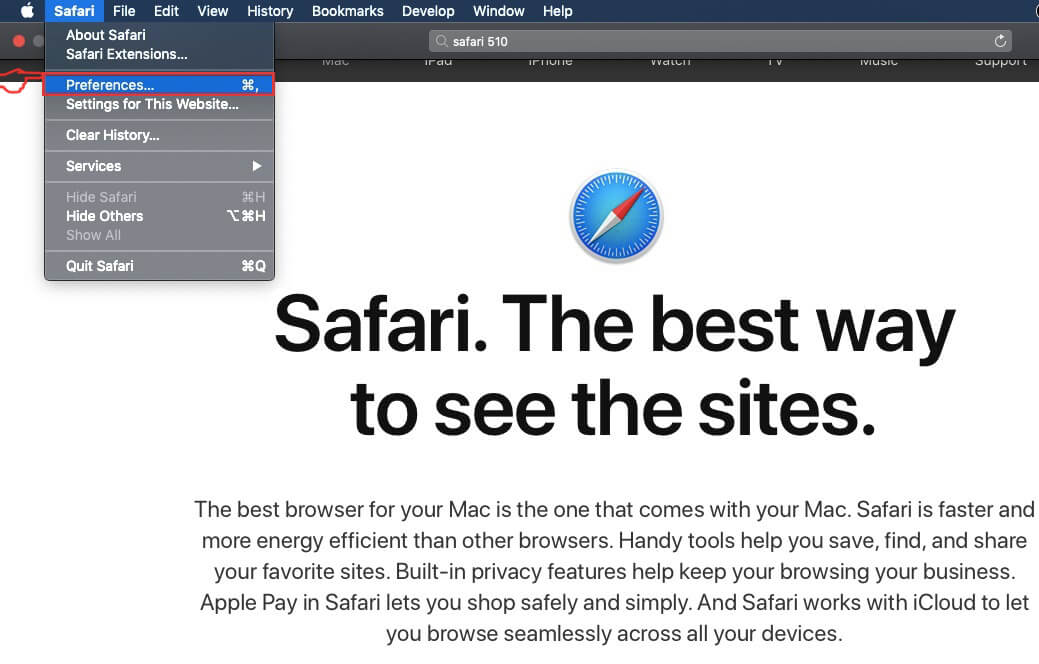
Step 4: After that, select the 'Extensions' Tab.

Step 5: Click once on the extension you want to remove.
Step 6: Click 'Uninstall'.
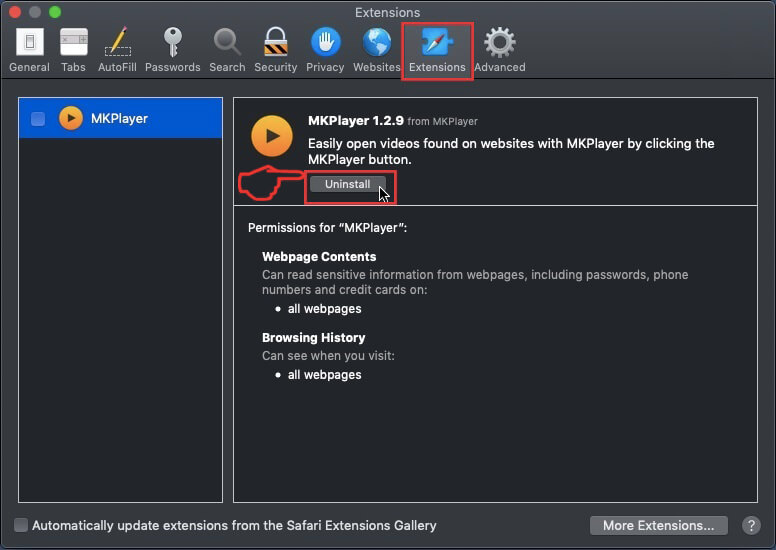
A pop-up window will appear asking for confirmation to uninstall the extension. Select 'Uninstall' again, and the Relevant Knowledge will be removed.
Eliminate Relevant Knowledge from Internet Explorer.
Step 1: Start Internet Explorer.
Step 2: Click on the gear icon labeled 'Tools' to open the drop menu and select 'Manage Add-ons'
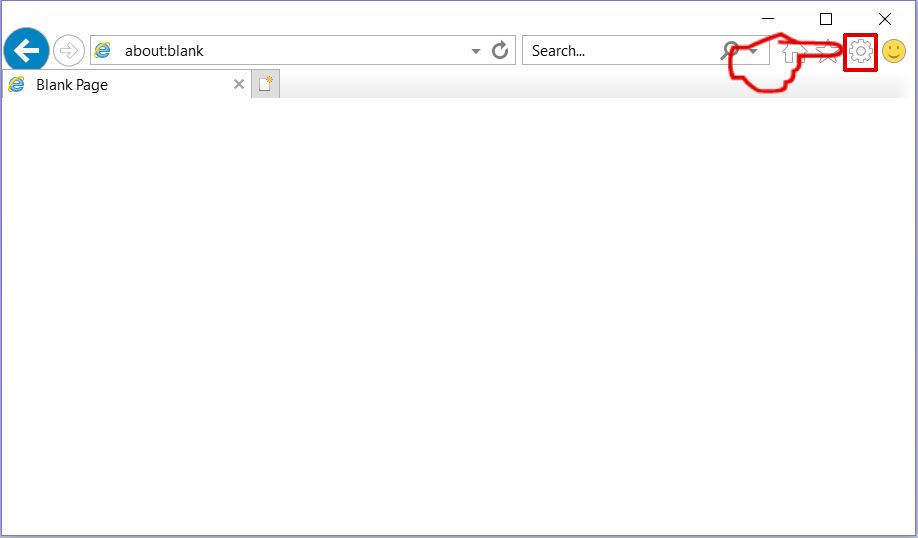
Step 3: In the 'Manage Add-ons' window.
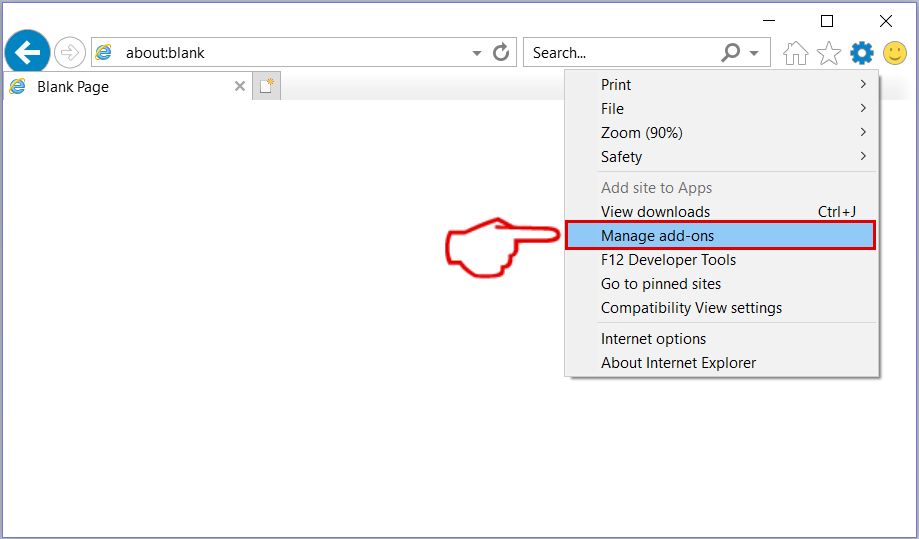
Step 4: Select the extension you want to remove and then click 'Disable'. A pop-up window will appear to inform you that you are about to disable the selected extension, and some more add-ons might be disabled as well. Leave all the boxes checked, and click 'Disable'.
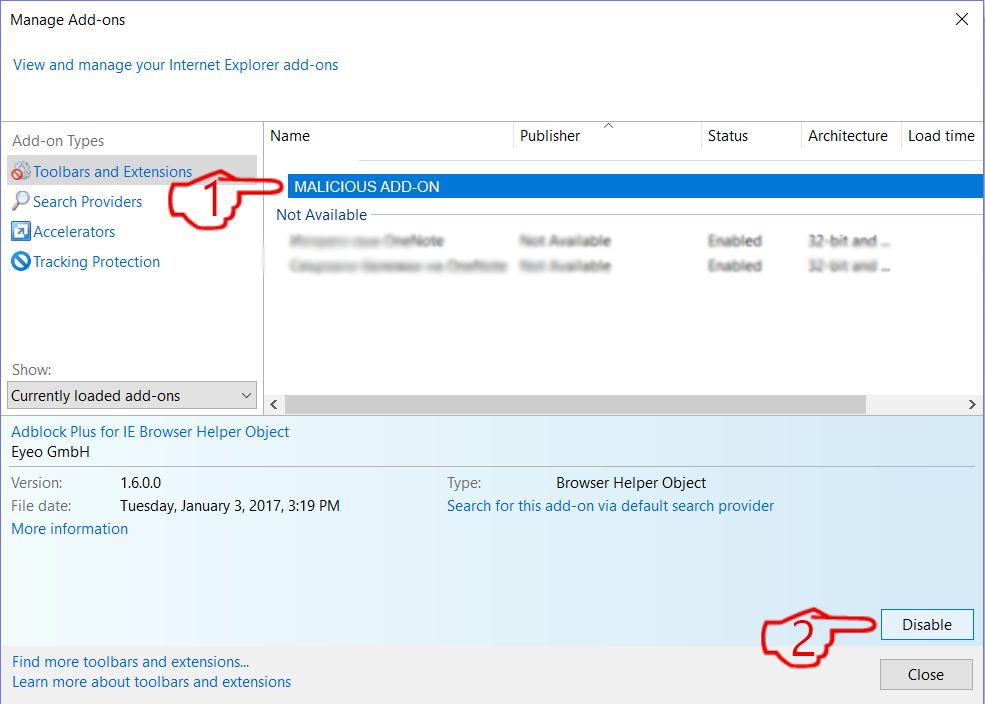
Step 5: After the unwanted extension has been removed, restart Internet Explorer by closing it from the red 'X' button located at the top right corner and start it again.
Remove Push Notifications from Your Browsers
Turn Off Push Notifications from Google Chrome
To disable any Push Notices from Google Chrome browser, please follow the steps below:
Step 1: Go to Settings in Chrome.
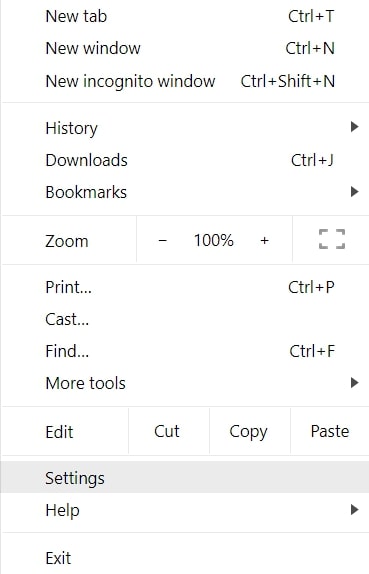
Step 2: In Settings, select “Advanced Settings”:
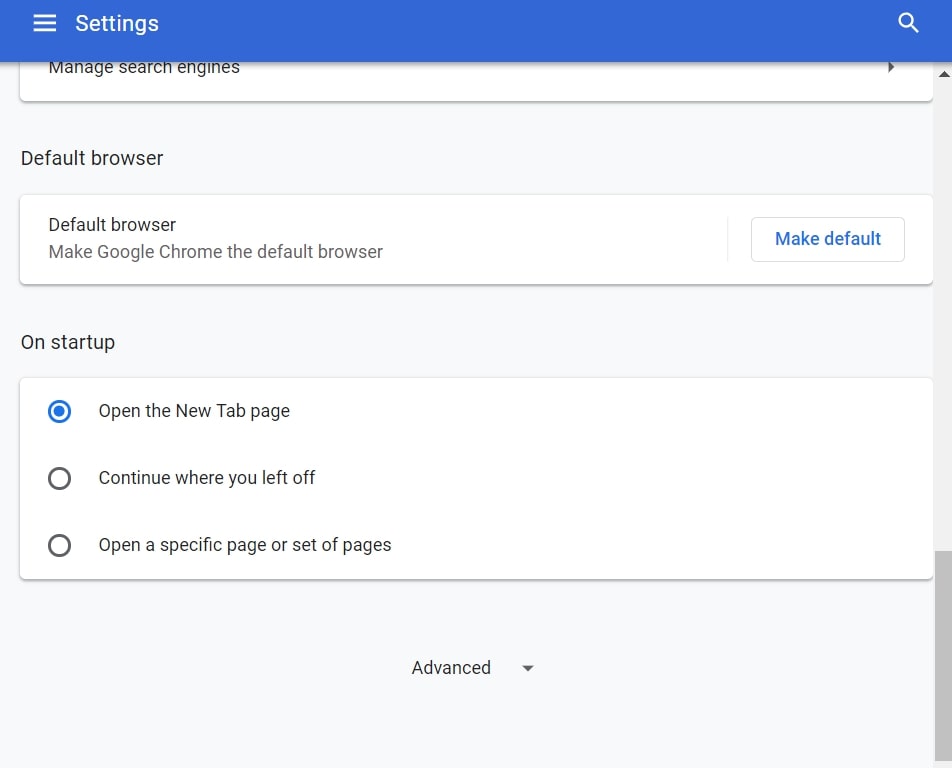
Step 3: Click “Content Settings”:
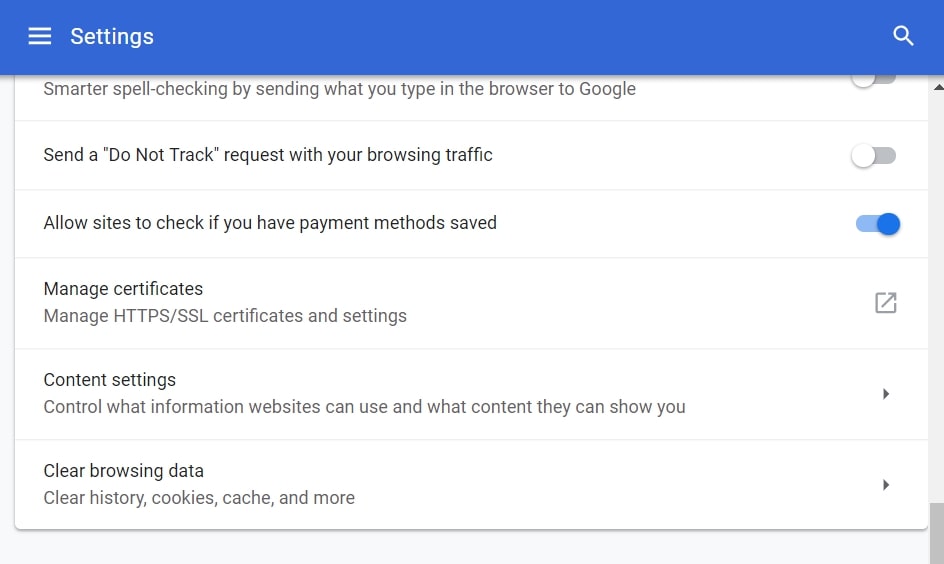
Step 4: Open “Notifications”:
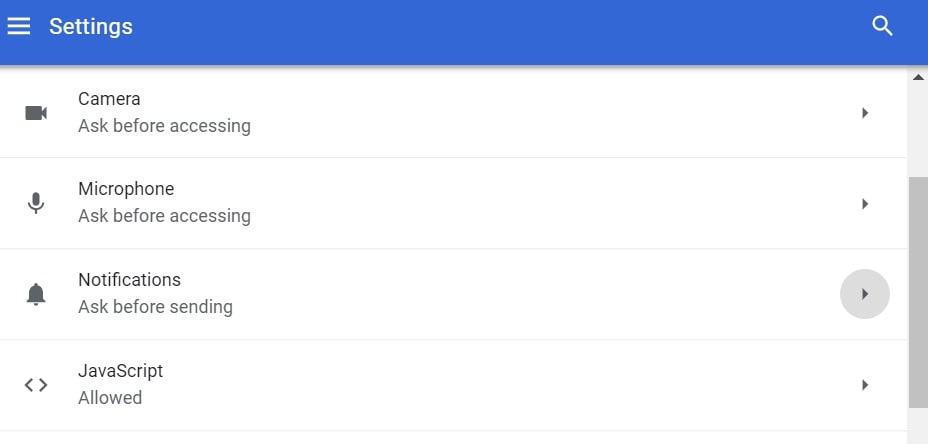
Step 5: Click the three dots and choose Block, Edit or Remove options:

Remove Push Notifications on Firefox
Step 1: Go to Firefox Options.
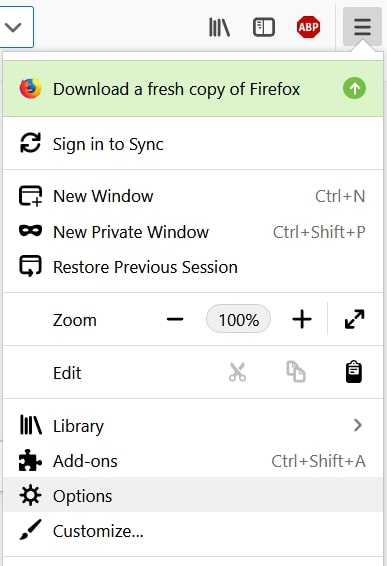
Step 2: Go to “Settings”, type “notifications” in the search bar and click "Settings":
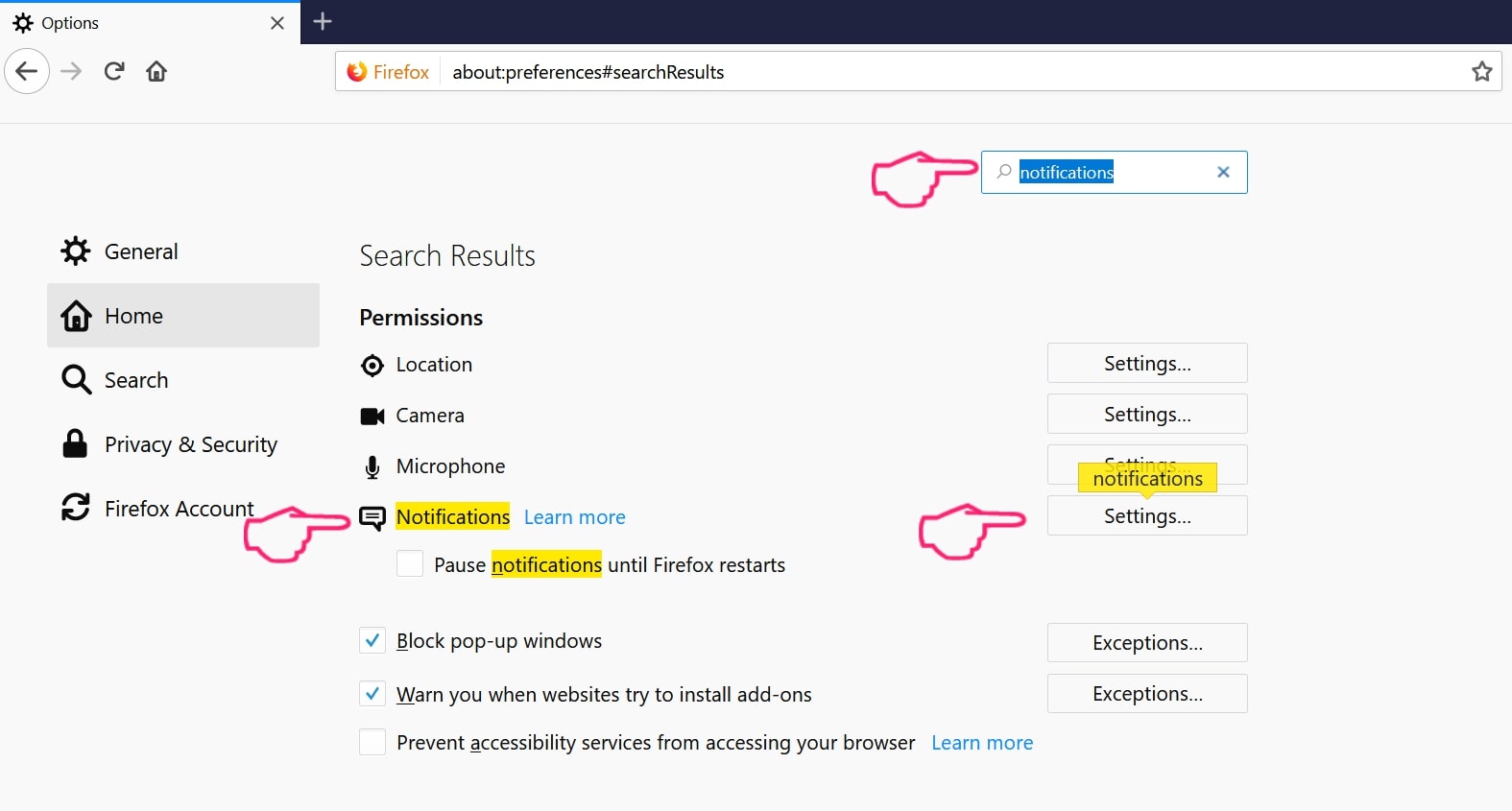
Step 3: Click “Remove” on any site you wish notifications gone and click “Save Changes”
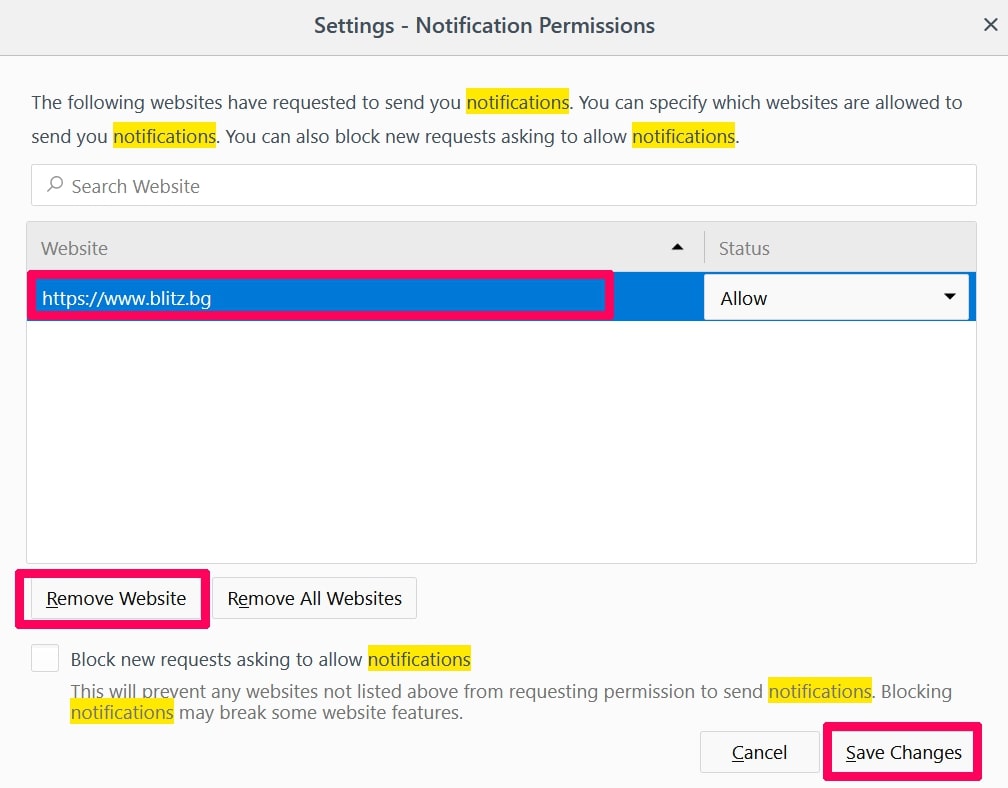
Stop Push Notifications on Opera
Step 1: In Opera, press ALT+P to go to Settings.

Step 2: In Setting search, type “Content” to go to Content Settings.
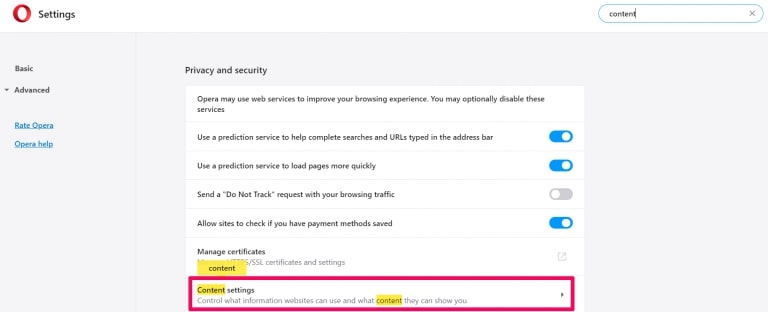
Step 3: Open Notifications:
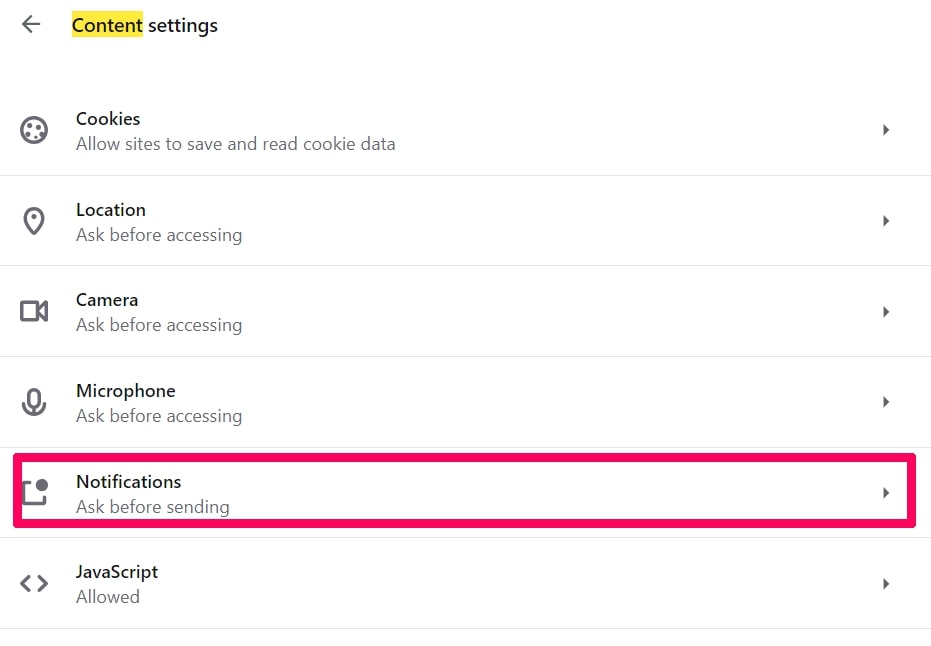
Step 4: Do the same as you did with Google Chrome (explained below):
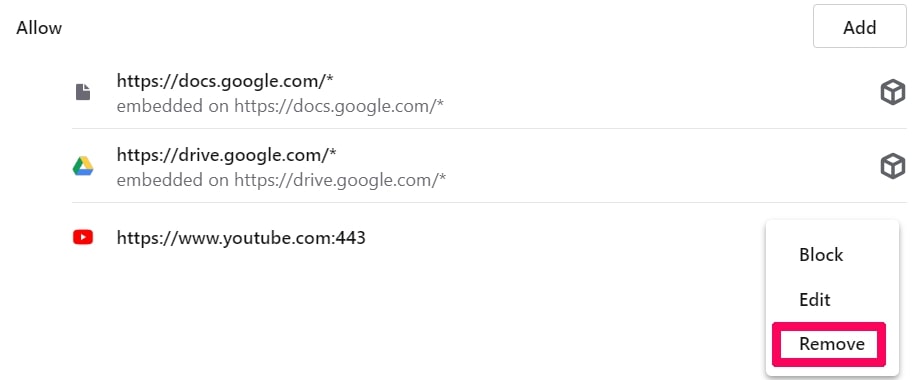
Eliminate Push Notifications on Safari
Step 1: Open Safari Preferences.
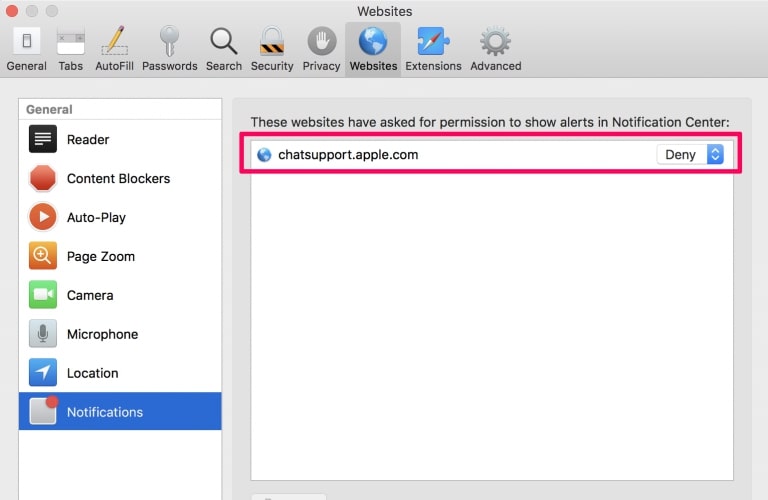
Step 2: Choose the domain from where you like push pop-ups gone and change to "Deny" from "Allow".
Relevant Knowledge-FAQ
What Is Relevant Knowledge?
The Relevant Knowledge threat is adware or browser redirect virus.
It may slow your computer down significantly and display advertisements. The main idea is for your information to likely get stolen or more ads to appear on your device.
The creators of such unwanted apps work with pay-per-click schemes to get your computer to visit risky or different types of websites that may generate them funds. This is why they do not even care what types of websites show up on the ads. This makes their unwanted software indirectly risky for your OS.
What Are the Symptoms of Relevant Knowledge?
There are several symptoms to look for when this particular threat and also unwanted apps in general are active:
Symptom #1: Your computer may become slow and have poor performance in general.
Symptom #2: You have toolbars, add-ons or extensions on your web browsers that you don't remember adding.
Symptom #3: You see all types of ads, like ad-supported search results, pop-ups and redirects to randomly appear.
Symptom #4: You see installed apps on your Mac running automatically and you do not remember installing them.
Symptom #5: You see suspicious processes running in your Task Manager.
If you see one or more of those symptoms, then security experts recommend that you check your computer for viruses.
What Types of Unwanted Programs Are There?
According to most malware researchers and cyber-security experts, the threats that can currently affect your device can be rogue antivirus software, adware, browser hijackers, clickers, fake optimizers and any forms of PUPs.
What to Do If I Have a "virus" like Relevant Knowledge?
With few simple actions. First and foremost, it is imperative that you follow these steps:
Step 1: Find a safe computer and connect it to another network, not the one that your Mac was infected in.
Step 2: Change all of your passwords, starting from your email passwords.
Step 3: Enable two-factor authentication for protection of your important accounts.
Step 4: Call your bank to change your credit card details (secret code, etc.) if you have saved your credit card for online shopping or have done online activities with your card.
Step 5: Make sure to call your ISP (Internet provider or carrier) and ask them to change your IP address.
Step 6: Change your Wi-Fi password.
Step 7: (Optional): Make sure to scan all of the devices connected to your network for viruses and repeat these steps for them if they are affected.
Step 8: Install anti-malware software with real-time protection on every device you have.
Step 9: Try not to download software from sites you know nothing about and stay away from low-reputation websites in general.
If you follow these recommendations, your network and all devices will become significantly more secure against any threats or information invasive software and be virus free and protected in the future too.
How Does Relevant Knowledge Work?
Once installed, Relevant Knowledge can collect data using trackers. This data is about your web browsing habits, such as the websites you visit and the search terms you use. It is then used to target you with ads or to sell your information to third parties.
Relevant Knowledge can also download other malicious software onto your computer, such as viruses and spyware, which can be used to steal your personal information and show risky ads, that may redirect to virus sites or scams.
Is Relevant Knowledge Malware?
The truth is that PUPs (adware, browser hijackers) are not viruses, but may be just as dangerous since they may show you and redirect you to malware websites and scam pages.
Many security experts classify potentially unwanted programs as malware. This is because of the unwanted effects that PUPs can cause, such as displaying intrusive ads and collecting user data without the user’s knowledge or consent.
About the Relevant Knowledge Research
The content we publish on SensorsTechForum.com, this Relevant Knowledge how-to removal guide included, is the outcome of extensive research, hard work and our team’s devotion to help you remove the specific, adware-related problem, and restore your browser and computer system.
How did we conduct the research on Relevant Knowledge?
Please note that our research is based on independent investigation. We are in contact with independent security researchers, thanks to which we receive daily updates on the latest malware, adware, and browser hijacker definitions.
Furthermore, the research behind the Relevant Knowledge threat is backed with VirusTotal.
To better understand this online threat, please refer to the following articles which provide knowledgeable details.


